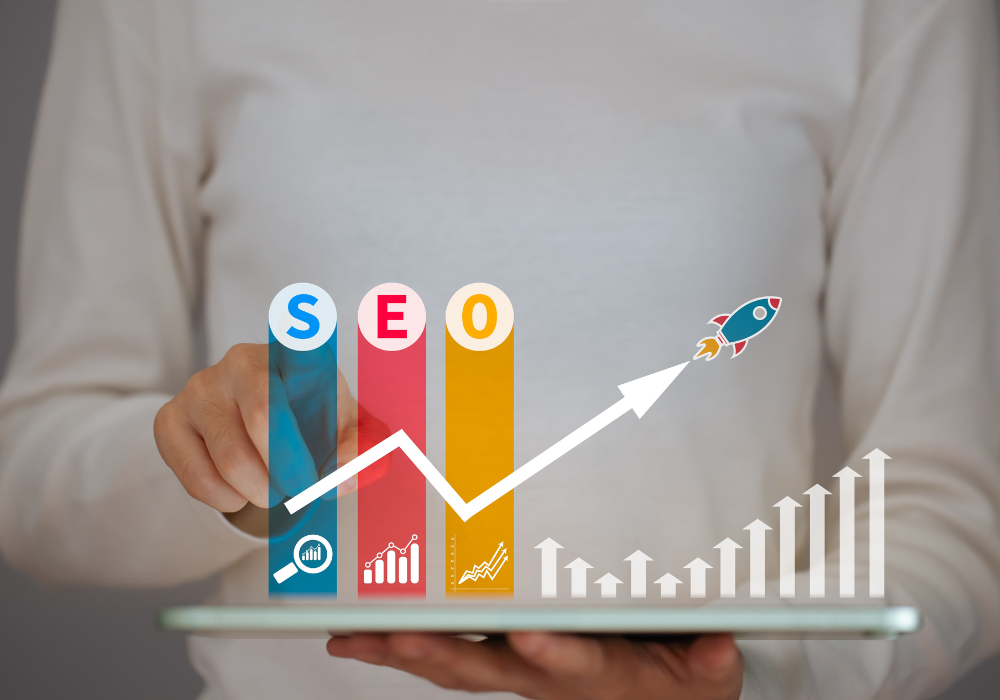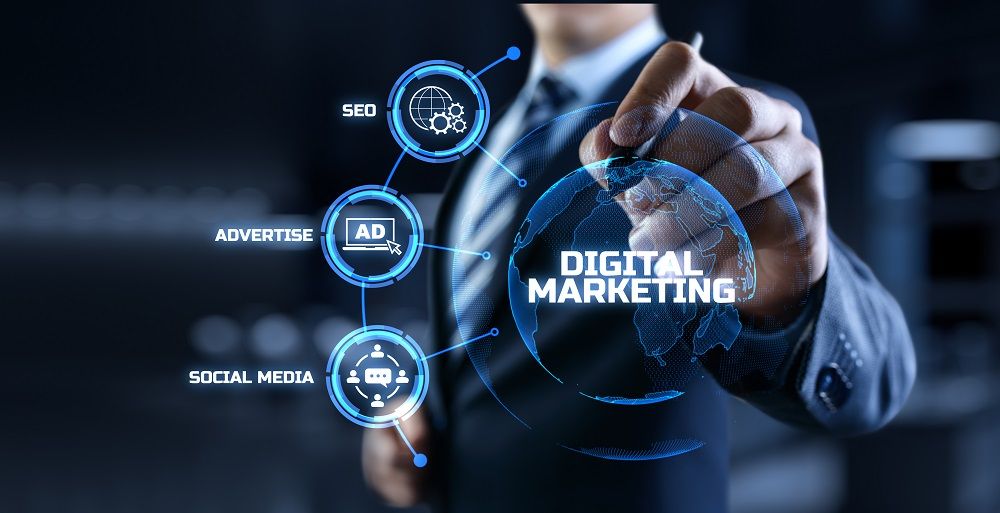SEO vs Digital Marketing: Top 6 Differences You Need to Know for Organizational Growth

Navigating the digital landscape can be complex, especially when differentiating SEO vs. digital marketing. Search Engine Optimization (SEO) and digital marketing are pivotal in the digital strategy of any business, yet they differ significantly in their approach and objectives. This blog aims to clarify the difference between SEO and digital marketing and provide insights into how they uniquely contribute to online success.
In this blog, we will discuss the difference between SEO vs. Digital Marketing in the following aspects:
- Definition and Scope
- Primary Objectives
- Strategies and Tactics
- Timeframe for Results
- Measurement Metrics
- Budget Allocation
Definition and Scope
SEO (Search Engine Optimization)
SEO is a specialized technique focused on optimizing websites to improve their visibility in search engine results. Significantly, it’s a critical component of digital marketing, yet it has a distinct scope and methodology. This distinction is central to understanding SEO vs. digital marketing. Primarily, SEO involves tweaking various elements of a website to make it more attractive to search engines like Google. This process, crucial for organic search visibility, is a cornerstone of any digital marketing strategy. It’s a targeted approach that plays a significant role in the broader context of SEO vs. digital marketing.
Unlike broader digital marketing efforts, the scope of SEO primarily focuses on enhancing a website’s organic search rankings. This focus is crucial for long-term digital success. Hence, it’s a key aspect when considering the difference between SEO and digital marketing.
Digital Marketing
Digital marketing covers a broad spectrum of online marketing approaches. It’s a holistic strategy for promoting a brand or product online. Furthermore, understanding this broad scope is essential when exploring SEO vs. digital marketing. Digital marketing comprises not just SEO but also various strategies, for instance, social media marketing, email marketing, and paid advertising. This diversity allows for a more comprehensive approach to online marketing. It’s a crucial element in the discussion of SEO vs digital marketing.
Although SEO is a component of digital marketing, the latter incorporates a broader range of activities. Additionally, digital marketing leverages multiple channels to build a brand’s online presence and reach potential customers. Thus, this extension is a crucial factor in understanding the difference between SEO and digital marketing.
ALSO READ: What is SEO – A Beginner’s Guide to Search Engine Optimization
Primary Objectives
 SEO (Search Engine Optimization)
SEO (Search Engine Optimization)
1. Improve Website Visibility in Organic Search Results
The key aim of SEO is to improve a website’s visibility in organic search results. Further, this goal is achieved by optimizing the site to rank higher for relevant keywords. Importantly, this focus is a defining aspect of SEO vs. digital marketing.
2. Enhance Website’s Ranking for Specific Keywords
SEO tactics are crafted to improving a website’s ranking for particular keywords. Hence, this focus is crucial for attracting targeted traffic to the site. It’s key to understanding the difference between SEO and digital marketing.
3. Increase Organic Traffic to the Website
The foremost purpose of SEO is to increase the website’s organic traffic as this leads to higher engagement and conversion rates. Thus, it’s a significant factor in the broader context of SEO vs. digital marketing.
Digital Marketing
1. Comprehensive Approach to Promote Products/Services
Digital marketing takes a more holistic approach. It’s not just about driving traffic but also about promoting products or services through various online channels. This comprehensive strategy is central to the concept of SEO vs. digital marketing.
2. Utilizes Multiple Online Channels for Brand Awareness and Customer Acquisition
Digital marketing strategies involve using multiple channels like social media, email, and paid advertising for brand awareness and customer acquisition. Hence, utilizing diverse channels is a crucial aspect of SEO vs. digital marketing.
3. Goal is Not Limited to Search Engine Rankings but Includes Overall Online Presence
The objectives of digital marketing extend beyond search engine rankings. Most importantly, it aims to enhance a brand’s overall online presence and reputation. Further, this broader goal is essential in understanding what is the difference between SEO and digital marketing.
ALSO READ: What is Digital Marketing? A Beginner’s Guide to the World of Digital Marketing
Strategies and Tactics
SEO (Search Engine Optimization)
1. On-Page Optimization (Meta Tags, Content, URL Structure)
SEO involves on-page optimization, which includes tweaking meta tags, improving content quality, and optimizing URL structures for better search engine visibility. Significantly, this aspect of SEO is a fundamental part of the discussion on SEO vs. digital marketing.
2. Off-Page Optimization (Backlink Building, Social Signals)
Off-page optimization represents another vital element of SEO. It involves building backlinks and generating social signals to enhance a website’s authority and ranking. Furthermore, this strategy is vital in distinguishing SEO vs. digital marketing.
3. Technical SEO (Site Speed, Mobile-Friendliness)
Lastly, technical SEO focuses on improving site speed and ensuring mobile-friendliness, which are vital for good search engine rankings. Hence, this technical aspect is a key differentiator in the SEO vs. digital marketing debate.
Digital Marketing
1. Social Media Marketing (SMM)
Digital marketing includes SMM which leverages platforms like Facebook, Twitter, and Instagram to engage with audiences and promote brands. This strategy highlights the broader scope of SEO vs. digital marketing.
2. Email Marketing
Email marketing is another effective digital marketing strategy. It involves sending targeted emails to nurture leads and convert them into customers. Moreover, this approach is a significant part of understanding what is the difference between SEO and digital marketing.
3. Content Marketing
Content marketing is a key component of digital marketing. It involves creating valuable content to attract and engage a target audience. Naturally, this strategy is central to the difference between SEO and digital marketing.
4. Pay-Per-Click (PPC) Advertising
PPC advertising is a digital marketing tactic where advertisers pay a fee each time one of their ads is clicked. Essentially, it’s a way of buying visits to your site, further illustrating the SEO vs. digital marketing distinction.
5. Affiliate Marketing
Affiliate marketing is a performance-based marketing strategy. It requires collaborating with individuals or businesses to endorse products or services in return for a commission. Further, this method expands on the SEO vs. digital marketing comparison.
ALSO READ: The Ultimate Guide to 20 Digital Marketing Types for Aspiring Marketers
 Timeframe for Results
Timeframe for Results
SEO (Search Engine Optimization)
1. Requires Time for Search Engines to Index and Rank Pages
SEO requires a long-term perspective, as it involves the gradual indexing and ranking of web pages by search engines over time. Hence, this aspect is crucial in the SEO vs. digital marketing comparison, as it highlights the patience required for SEO to yield results.
2. Long-Term Strategy With Gradual Results
The results from SEO efforts take time. Rather, it’s a long-term strategy that yields gradual but sustainable results. Moreover, this characteristic is a key factor in understanding what is the difference between SEO and digital marketing.
Digital Marketing
1. Immediate Results Possible With Paid Advertising
Digital marketing, on the other hand, can provide immediate results, especially with tactics like paid advertising. This immediacy is a significant point of differentiation in the SEO vs. digital marketing discussion.
2. Short-Term and Long-Term Strategies Depending on the Channel
Lastly, digital marketing encompasses both short-term and long-term strategies. The durations in which the results are achieved can vary depending on the chosen channel. Additionally, this versatility is an important aspect of the difference between SEO and digital marketing.
ALSO READ: How to Become a Digital Marketing Executive: Everything You Need to Know
Measurement Metrics
SEO (Search Engine Optimization)
1. Keyword Rankings
One of the primary metrics for measuring SEO success is keyword rankings. Typically, higher rankings lead to more traffic and visibility. Furthermore, this metric is essential in the SEO vs. digital marketing analysis, as it directly reflects the effectiveness of SEO strategies.
2. Organic Traffic Growth
Another essential metric is the growth in organic traffic. A rise in organic traffic is an indicator of effective SEO usage. Hence, this growth is crucial when discussing the difference between SEO and digital marketing.
3. Backlink Quality and Quantity
SEO marketing relies on the quality and quantity of backlinks. They are indicators of a website’s authority and relevance. Consequently, this factor is significant in understanding the difference between SEO and digital marketing.
Digital Marketing
1. Engagement Metrics (Likes, Shares, Comments)
In digital marketing, engagement metrics like likes, shares, and comments are important. They indicate how well the audience is interacting with the content. Furthermore, these metrics highlight a key area of focus in the SEO vs. digital marketing conversation.
2. Conversion Rates
Conversion rates are critical in digital marketing. In essence, they measure the effectiveness of a strategy in turning visitors into customers. This measurement is a pivotal point in the SEO vs. digital marketing comparison.
3. Return on Investment (ROI)
ROI is a key metric in digital marketing. It measures the profitability of the marketing efforts and helps in evaluating their effectiveness. Furthermore, understanding ROI is essential in the broader context of SEO vs digital marketing.
ALSO READ: How These 10 Local SEO Strategies Can Attract More Business
Budget Allocation
SEO (Search Engine Optimization)
The budget for SEO primarily involves costs related to optimizing website elements, such as content creation and technical improvements. This focus is a critical aspect of the SEO vs. digital marketing discussion, emphasizing the targeted investment in specific areas for SEO. Most of the SEO budget is allocated to content creation and link-building efforts. These are essential for improving rankings and visibility. For this reason, the allocation strategy is a key factor in understanding the difference between SEO and digital marketing.
Digital Marketing
In digital marketing, the costs can vary widely depending on the channels used. For instance, advertising costs can fluctuate based on the campaign. This variability is a significant distinction in the SEO vs. digital marketing comparison. Moreover, the budget for digital marketing is more diverse, covering various strategies from social media campaigns to email marketing and beyond. This diversity in budget allocation is essential in the broader context of what is the difference between SEO and digital marketing.
ALSO READ: A Simple Guide to 9 Types of SEO: Find Your Strategy for Success
Wrapping Up: SEO vs. Digital Marketing Differences
To wrap up, understanding the difference between SEO and digital marketing is vital for anyone looking to make an impact online. While SEO focuses on improving organic search visibility, digital marketing encapsulates a broader range of strategies to build a comprehensive online presence. If you want to deepen your knowledge in this field, consider exploring Emeritus’ digital marketing courses to enhance your skills and understanding.
Write to us at content@emeritus.org







